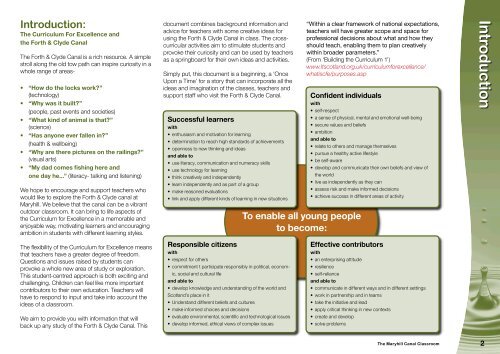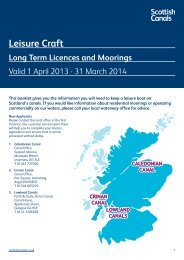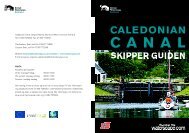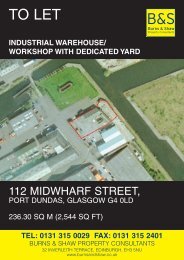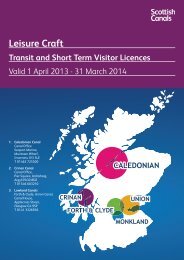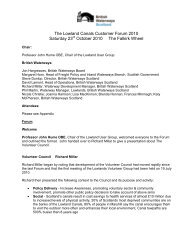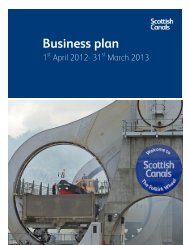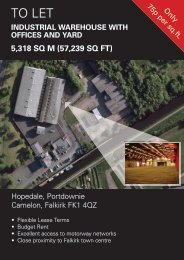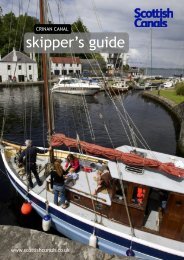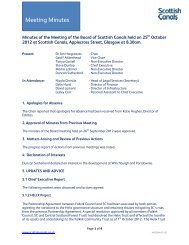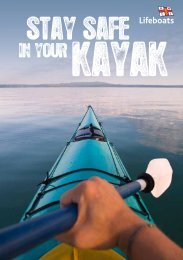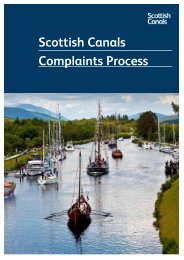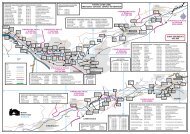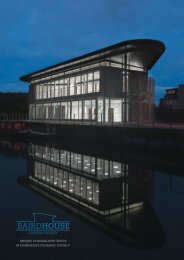Maryhill Canal Classroom - Scottish Canals
Maryhill Canal Classroom - Scottish Canals
Maryhill Canal Classroom - Scottish Canals
Create successful ePaper yourself
Turn your PDF publications into a flip-book with our unique Google optimized e-Paper software.
Introduction:<br />
The Curriculum For Excellence and<br />
the Forth & Clyde <strong>Canal</strong><br />
The Forth & Clyde <strong>Canal</strong> is a rich resource. A simple<br />
stroll along the old tow path can inspire curiosity in a<br />
whole range of areas-<br />
• “How do the locks work?”<br />
(technology)<br />
• “Why was it built?”<br />
(people, past events and societies)<br />
• “What kind of animal is that?”<br />
(science)<br />
• “Has anyone ever fallen in?”<br />
(health & wellbeing)<br />
• “Why are there pictures on the railings?”<br />
(visual arts)<br />
• “My dad comes fishing here and<br />
one day he...” (literacy- talking and listening)<br />
We hope to encourage and support teachers who<br />
would like to explore the Forth & Clyde canal at<br />
<strong>Maryhill</strong>. We believe that the canal can be a vibrant<br />
outdoor classroom. It can bring to life aspects of<br />
the Curriculum for Excellence in a memorable and<br />
enjoyable way, motivating learners and encouraging<br />
ambition in students with different learning styles.<br />
document combines background information and<br />
advice for teachers with some creative ideas for<br />
using the Forth & Clyde <strong>Canal</strong> in class. The crosscurricular<br />
activities aim to stimulate students and<br />
provoke their curiosity and can be used by teachers<br />
as a springboard for their own ideas and activities.<br />
Simply put, this document is a beginning, a ‘Once<br />
Upon a Time’ for a story that can incorporate all the<br />
ideas and imagination of the classes, teachers and<br />
support staff who visit the Forth & Clyde <strong>Canal</strong>.<br />
Successful learners<br />
with<br />
• enthusiasm and motivation for learning<br />
• determination to reach high standards of achievements<br />
• openness to new thinking and ideas<br />
and able to<br />
• use literacy, communication and numeracy skills<br />
• use technology for learning<br />
• think creatively and independently<br />
• learn independently and as part of a group<br />
• make reasoned evaluations<br />
• link and apply different kinds of learning in new situations<br />
“Within a clear framework of national expectations,<br />
teachers will have greater scope and space for<br />
professional decisions about what and how they<br />
should teach, enabling them to plan creatively<br />
within broader parameters.”<br />
(From ‘Building the Curriculum 1’)<br />
www.ltscotland.org.uk/curriculumforexcellence/<br />
whatiscfe/purposes.asp<br />
Confident individuals<br />
with<br />
• self-respect<br />
• a sense of physical, mental and emotional well-being<br />
• secure values and beliefs<br />
• ambition<br />
and able to<br />
• relate to others and manage themselves<br />
• pursue a healthy active lifestyle<br />
• be self-aware<br />
• develop and communicate their own beliefs and view of<br />
the world<br />
• live as independently as they can<br />
• assess risk and make informed decisions<br />
• achieve success in different areas of activity<br />
To enable all young people<br />
to become:<br />
Introduction<br />
The flexibility of the Curriculum for Excellence means<br />
that teachers have a greater degree of freedom.<br />
Questions and issues raised by students can<br />
provoke a whole new area of study or exploration.<br />
This student-centred approach is both exciting and<br />
challenging. Children can feel like more important<br />
contributors to their own education. Teachers will<br />
have to respond to input and take into account the<br />
ideas of a classroom.<br />
We aim to provide you with information that will<br />
back up any study of the Forth & Clyde <strong>Canal</strong>. This<br />
Responsible citizens<br />
with<br />
• respect for others<br />
• commitment t participate responsibly in political, economic,<br />
social and cultural life<br />
and able to<br />
• develop knowledge and understanding of the world and<br />
Scotland’s place in it<br />
• Understand different beliefs and cultures<br />
• make informed choices and decisions<br />
• evaluate environmental, scientific and technological issues<br />
• develop informed, ethical views of complex issues<br />
Effective contributors<br />
with<br />
• an enterprising attitude<br />
• resilience<br />
• self-reliance<br />
and able to<br />
• communicate in different ways and in different settings<br />
• work in partnership and in teams<br />
• take the initiative and lead<br />
• apply critical thinking in new contexts<br />
• create and develop<br />
• solve problems<br />
The <strong>Maryhill</strong> <strong>Canal</strong> <strong>Classroom</strong><br />
2


